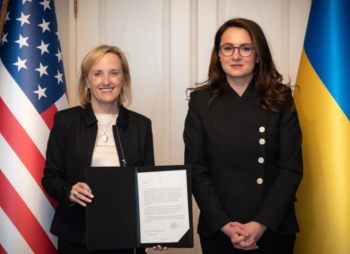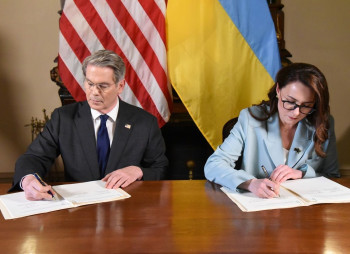Ukraine's debt deal was recently announced and we would appreciate if you share with us your opinion about this deal. How do you assess this deal?
Answer: It is a very welcome deal. I know people are arguing whether it is good or bad, but I think it is great to have such a deal. Good negotiations are that when both parties are unhappy, because it means that they reached a good compromise. So I understand that there are debates, but I think that it is a very good thing that there is a transaction now and the reason is that this restructuring has been hanging over the future of Ukraine and investment in the country like a dark cloud. Now, when the deal is done, though it needs to be ratified, this cloud is gone, which means that investors have visibility. That is very important, because it means that investors will now be able to make plans. It is very significant that uncertainty has gone from the landscape and as a result investment will take place.
After this cloud has gone, will it impact on the EBRD's investments in Ukraine?
Certainly, for two reasons. One is that we have a deal with a sovereign - we always ask for a sovereign guarantee, especially with Naftogaz-Ukraine which has a sovereign guarantee. So, having this kind of sovereign visibility with this deal makes it easier for us to make the decision on whether to continue or to increase lending to companies like Naftogaz.
The other thing is that we don't create transactions in the EBRD. What we do is to help investors make them happen. So when the investors have an idea and the will, they find that it is going be much easier, much safer to implement this idea when you have funding from the EBRD. However, the investors have to have the idea and willingness to invest in the first place. We don't go around and push people to invest in Ukraine. We talk to people who are interesting in investing in Ukraine. So if this does happen and more people are interested in investing in Ukraine, this creates more opportunities for the EBRD to support them and to that extent it should enable us to do more to increase the attractiveness of this country.
Which sectors can you mention as the most interesting at the moment to invest in Ukraine, which sectors would you promote or push between investors?
I think that strength of Ukraine has always been agribusiness. This is very strong sector for us. Last year we have invested EUR 250 mln in the agribusiness sector. The other reasons is that it is export-oriented sector and therefore is certainly easier to finance because the revenues are in dollar and you can protect yourself to a large extent from the volatility of the currency when you invest in agribusiness.
Another one which is very interesting right now is the technologic sector. It includes IT, IT-outsourcing, but we are broadly speaking about technology. It is a very promising sector.
I think the third one which may be more interesting in the midterm is manufacturing. In fact in Ukraine right now, given the currency situation, you have very favorable situation for investors, in the sense that the skills that the population have are very good and the cost of labor in the country has become very attractive, essentially when you have the cost of labor in this country is similar to countries in South-East Asia whereas the skill level is much higher and this is the country is in Europe. So it is very attractive as an investment destination provided that authorities can create a better investment climate. The next horizon or the next battle to be fought which is the one to improve the business environment, to make the investment climate where investors feel comfortable and secure investing in Ukraine and these is going to yield massive results. Fighting corruption, more predictable rules, some simplification of administration, some deregulation, will make returns on these investments very high.
In this regard I know that the bank will discuss this week providing technical aid to Ukraine to conduct transparent and efficient privatization. Is the EBRD interested to taking part in privatization, for instance to push some projects or to take part in consortium of investors if one was organized to buy some assets?
Yes, the answer is clearly yes to your questions. I think we are providing technical assistance in many different ways in Ukraine, from helping with the financial system and helping with agribusinesses to helping with privatization. We have been in a dialog with the authorities and state property funds to launch privatization and I very much welcome the decision of the Ukraine's authorities to take the time to do it right. There was a debate about whether one or two privatizations should be pushed through very quickly to privatize large companies like Odessa port side plant. I would say that it is a wise decision that authorities have taken which I support because companies like Odessa port side plant should be sold to reputable investors. They are going to run it in the spirit of a competitive market and it takes time to prepare a proper valuation of the company, it takes time to establish proper criteria for evaluation of the investor. It is not just about the money, it is not just about the coming to an auction day with cameras. It is about declaring who you are, it is about declaring what your intentions are for the assets for the company. It is about declaring what your strategy is going to be with regards to the product, to the price, to the people and to the employees and so on, and that takes time to specify, to properly evaluate and that is exactly what we are going to provide technical assistance for.
If some investors are interested in privatization would like to engage the EBRD we will be prepared to participate.
And one more question. At one time the EBRD was considering issuing bonds denominated in the Ukrainian hrivnya. Are such plans still possible and if so when they may be realized?
I have two answers to your question. The first answer is yes. To the second question unfortunately I do not know. It is because of the yes we do have plans to issue bonds in Ukrainian hrivnya. But issuing bond in hrivnya depends on two things. One is the regulatory framework that makes it possible for us to do such a transaction. It has taken years of hard work with the authorities to get there. The other reason is the market that makes it a sensible thing to do. I mean that at the current interest rates potential clients may be uninterested in the money. The other reason for us to issue bonds in hrivnya is to be able to lend hrivnya to our clients. If the interest rates environment remains the same it is going to be hard to have a market for these bonds that makes sense. However, these transactions with creditors should improve things very significantly because it provides a much better horizon for macroeconomic stability in the country. This should not only have an impact on the interest rates. I would expect that in the medium term transactions with investors should have a good impact on interest rates.






